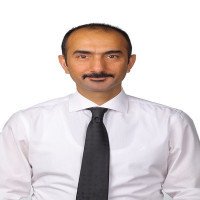Research Article
Issue Editorial Board


1987 yılında Kırıkkale’de doğdu. İlköğretim ve lise öğrenimini Kırıkkale'de tamamladı. 2011 yılında Erciyes Üniversitesi Elektrik Elektronik Mühendisliği bölümünü, 2012 yılında Erciyes Üniversitesi İnşaat Mühendisliği bölümünü bitirmiştir. 2013 yılına kadar şantiye şefliği görevinde bulunmuş ve 2013 yılında akademik hayata başlamıştır. 2016 yılında yüksek lisans eğitimini ve 2019 yılında doktora eğitimine tamamlamıştır. Kırıkkale Üniversitesi İnşaat Mühendisliği Bölümünde Ulaştırma A.B.D’nda Öğretim Üyesi olarak görevini yürütmektedir. Ulusal ve Uluslararası alanda birçok makale ve bildirisi bulunmaktadır.

Dr. Hüsamettin Tan, 1991 yılında Malatya'da doğdu. Lise eğitimini 2009 yılında Edirne Lisesi, lisans eğitimini 2014 yılında Gazi Üniversitesinde, sırasıyla yüksek lisans eğitimini 2017 yılında ve doktora eğitimini 2022 yılında Kırıkkale Üniversitesinde tamamladı. Dr. Hüsamettin Tan soğutma sistemleri ve ısıl sistemler üzerine çalışmaktadır. Çalışma yaptığı diğer konu başlıkları: Isı Transferi, Termodinamik, Enerji Sistemleri, Isıl Sistemlerinin Tasarımı ve Analizi, HAD Analizi.

1991 yılında Ankara’da doğdu. İlköğretim ve lise öğrenimini Ankara’da tamamladı. 2014 yılında Süleyman Demirel Üniversitesi İnşaat Mühendisliği bölümünü dereceyle bitirdi. Kırıkkale Üniversitesi İnşaat Mühendisliği Bölümde 2016-2023 yılları arasında Araştırma Görevlisi olarak hizmette bulunmuş olup, 2023 yılında itibaren Mekanik A.B.D’nda Dr. Öğr. Üyesi unvanıyla ankraj performansı ve Yığma bina deprem performansı konularında çalışmalarını sürdürmektedir.


Aim & Scope
The areas of interest of the journal include, without limitation, Electrical and Electronics Engineering, Mechanical Engineering, Civil Engineering, Computer Engineering, Industrial Engineering, Metallurgical and Materials Engineering, Bioengineering and Architecture.
Author Guidelines
You can reach the article format here for your submission.
You can reach the copyright transfer form here for your submission.
In order to ensure the scientific quality, originality, and contribution potential of the articles to be published in our journal, a meticulous evaluation process is applied. This process begins with the preliminary review of your manuscript and continues with the evaluation of independent reviewers who are experts in their fields. Our editorial team is committed to ensuring that the work you submit is evaluated in an objective, constructive, and impartial manner.
One of the most important factors in enabling us to make high-quality contributions to the scientific community is ensuring that our review process is transparent, fair, and completed within the specified timeframes. Throughout the process, we will keep you regularly informed about the status of your manuscript and any necessary revisions.
Article submissions to our journal are made only through the DergiPark system.
Preliminary Evaluation
The manuscript you have submitted will be examined within the scope of the preliminary evaluation, which is the first stage of the evaluation process in our journal, in terms of the conformity of your work with the general writing rules and the completeness of the documents to be uploaded. At this stage, only format and document conformity will be evaluated, and no peer review has been carried out yet.
If your article passes the format and document control, your work will be directed to the editorial process and, if appropriate, sent to expert field editors. We will keep you informed about the status of your article at every stage of the process.
Editorial Board Evaluation
The Editorial Board is responsible for deciding whether to accept the submitted manuscripts into the refereeing process or to reject them without entering the refereeing process. At this stage, the Editorial Board may decide to reject the manuscript based on criteria such as insufficient originality, significant conceptual and/or methodological flaws, inadequate or weak language (English), originality, or if the manuscript is outside the scope and purpose of the journal. For all articles rejected without being included in the refereeing process, the Editorial Board will provide the author(s) with reasoned feedback.
Articles that are deemed suitable for the refereeing process are forwarded by the Editorial Board to the relevant field editor to initiate the blind refereeing process. The field editor determines the expert referees for the article and carries out the process with the double-blinding method. Thus, the identities of the authors and referees are kept confidential throughout the evaluation process and an impartial evaluation is ensured.
Referee Evaluation
Articles deemed suitable for the refereeing process by the Editorial Board are forwarded to the field editor. The field editor forwards the submitted article to at least two referees who are experts in their fields. In order for the article to be published, at least two referees must give a positive evaluation report. Field editors should avoid assigning referees who may have conflicts of interest with the authors of the article (such as being at the same university, thesis advisor relationship, or kinship) and should take care that the referees are not from a single university. In addition, all referees in our journal must have at least a PhD degree.
Within the framework of the double-blind review process applied in our journal, the identities of both authors and reviewers are kept confidential. Within the framework of this confidentiality, our authors and reviewers are kindly requested to pay attention to the following points:
- Authors should not include their identity information directly or indirectly in their articles.
- Information such as the fact that the article is produced from thesis work, has received project support or funding from any institution or organization, or has been presented at a congress should be kept confidential to be added after the article is accepted.
- Names and identifying information should never be used in the naming of the article or referee file, and author information should be removed from the document properties
- In cases where the author needs to cite himself/herself, he/she should use only “(Author/Author)” in the text and the same format in the bibliography.
After the corrections requested by the referees are made, the authors are required to fill out the “Response to Referee Comments and Manuscript Editing Tracking Form” and upload it to the system with the final version of the article.
Final Evaluation
The editorial board makes the final decision based on the referee reports and the field editor's opinion. The editor's decision is sent to the author(s) together with the referees' suggestions. Accepted articles are published according to their acceptance dates. There is no prioritization in this regard.
Ethical Principles and Publication Policy
Publication Ethics
The International Journal of Engineering Research and Development (IJERAD) is committed to adhering to the recommendations of the International Committee of Medical Journal Editors (ICMJE) and the International Standards for Editors and Authors of the Committee on Publication Ethics (COPE).
IJERAD is dedicated to conducting all publishing processes impartially, with integrity and accountability, in the service of scientific advancement. The journal evaluates submissions in a fair and ethical manner, without regard to authors’ religion, language, race, or other differences.
Submissions to IJERAD are reviewed using a double-blind peer review process by at least two reviewers. The identities of both authors and reviewers, as well as the confidentiality of the submitted work, are fully protected under the journal’s guarantee.
IJERAD selects reviewers who are experts in the relevant field to ensure the academic rigor of the review process.
Articles published by IJERAD are expected to make original and substantial contributions to science and must not have been published or submitted elsewhere or in another language.
The journal strictly prevents conflicts of interest among all stakeholders. IJERAD manages the review process in a way that safeguards the interests of the individuals and institutions involved with the manuscript.
IJERAD is committed to publishing corrections and notifying all relevant parties in the event of an identified breach of ethical standards.
The copyright for all works published in IJERAD belongs to the journal. Unauthorized use or reproduction of these works without proper citation or permission is prohibited.
Authors must confirm that their work is original, has not been published elsewhere or in another language, and has not been submitted for publication elsewhere or in another language, and that it does not involve any ethical concerns. Permissions for images, figures, tables, and excerpts must be obtained and properly acknowledged. All applicable copyright laws must be followed.
All authors listed on a manuscript must have made a scientific contribution to the work. The order of authors should reflect the level of contribution, from the most to the least. The consent of all authors must be obtained for the author order. Those who do not meet the criteria for authorship but have contributed to the work should be acknowledged in the acknowledgments section.
Reviewers who accept an invitation to evaluate a submission are considered to have agreed to abide by ethical guidelines, maintain confidentiality, and provide an unbiased assessment of the work.
During the review process, reviewers must ensure that they do not discuss the manuscript or disclose any of its content to third parties, thereby protecting its confidentiality.
Research Ethics
The choice of research topic should prioritize the benefit of humanity and science. The research conducted must be transparent and accountable.
Ethics committee approvals and necessary legal/special permissions must be obtained in accordance with the research topic. Unapproved or unethical research should not be conducted.
If the research involves the use of human and/or animal subjects, it must be declared that the study was conducted in accordance with relevant international declarations, guidelines, etc.
Researchers must transparently inform individuals, institutions, and organizations involved in the research about the purpose, methodology, expected outcomes, potential applications, and any associated risks of the study.
Participants must take part in the research voluntarily and without coercion. Consent forms must be obtained from participants before the research begins and should be available for presentation if requested. For participants under the age of 18 or those under legal guardianship, consent must be obtained from their legal guardian.
Researchers must ensure that their work does not put participants at risk.
Researchers are responsible for protecting the confidentiality of participants’ personal and other provided information. They must not allow any disclosures that could cause material or moral harm to the participants.
Researchers must ensure that the results of the study do not cause material or moral harm to individuals living in any country or region, or to people of different languages, religions, races, or other distinct characteristics.
Ethics Committee and Obtaining Legal / Special Permit Certificate
“Ethics Committee Permission” is required to conduct research on the following issues.
- All kinds of research conducted with qualitative or quantitative approaches that require data collection from participants using survey, interview, focus group study, observation, experiment, interview techniques,
- Use of humans and animals (including material/data) for experimental or other scientific purposes,
- Clinical research conducted on humans,
- Research conducted on animals,
- Retrospective studies in accordance with the Personal Data Protection Law.
In addition; - It should be stated that an “Informed consent form” was obtained in case reports,
- Permission should be obtained and stated from the owners for the use of scales, surveys, photographs belonging to others,
- It should be stated that copyright regulations are complied with for the intellectual and artistic works used.
Researchers should apply to the ethics committees in their region for all studies requiring ethics committee approval and obtain the necessary permissions.The name of the board, evaluation date and ethical permission document number of the ethics committee permission should be included in the method section of the study.A copy of the ethics committee permission document should be uploaded to the system while the study is being uploaded to the system for evaluation.If the study includes data belonging to an institution, special permission should be obtained from the relevant institution indicating that the data is used. The information of the institution that gave permission and which data is allowed to be used should be stated in the acknowledgment section. If the study takes place in a privately owned area, special permission should be obtained from the relevant person and institution indicating that the data obtained is used. The information of the person and institution that gave permission and which data is allowed to be used should be stated in the acknowledgment section.If the entry or destruction of the study takes place in an area requiring special permission, special permission should be obtained from the relevant institutions for the conduct of the research. Information on the institutions that gave permission, and the type of permission should be provided in the acknowledgment section.A copy of the special permission documents obtained should also be uploaded to the system while the study is being uploaded to the system for evaluation.The International Journal of Engineering Research and Development reserves its legal rights in the event of any dispute.
Price Policy
Our journal does not charge any fee for article publication.
Kırıkkale University, Faculty of Engineering and Natural Science, 71450 Yahşihan / Kırıkkale, Türkiye.
ijerad@kku.edu.tr






